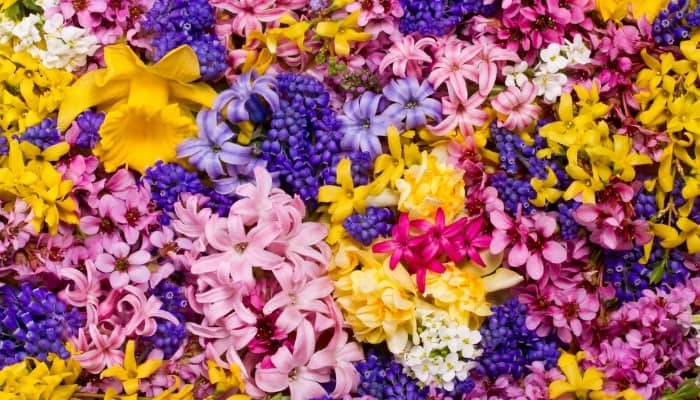Creating a compilation of your preferred names for flowers would not be complete without acknowledging the stunning plants that begin with the letter H.
The overview below puts each of these stunning plants on display, including details on their appearance, size, growing needs, colors, bloom time, and more. Enjoy!
1. Hairy Stemmed Rhipsalis
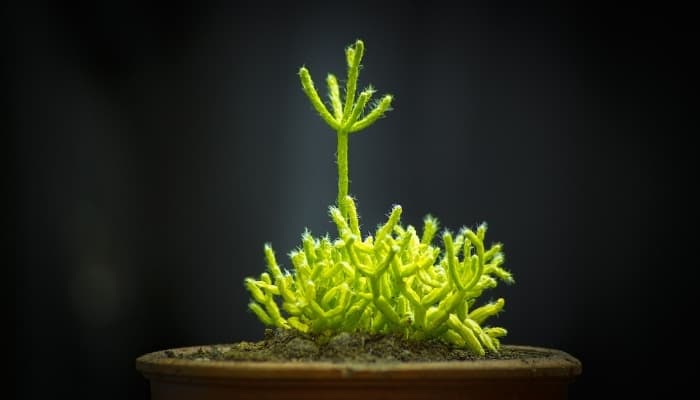
This is a fuzzy-stemmed hanging cactus with gray-green hairy stems. Areoles (small bumps), which transform into 2 cm bell-shaped flowers, cover each stem.
Flowers are white or peach colored and present a soft fragrance. Stems grow up to 16 inches (40 cm).
The Rhipsalis doesn’t thrive in full sun and therefore requires morning sun and full afternoon shade and regular watering.
2. Hardy Hibiscus
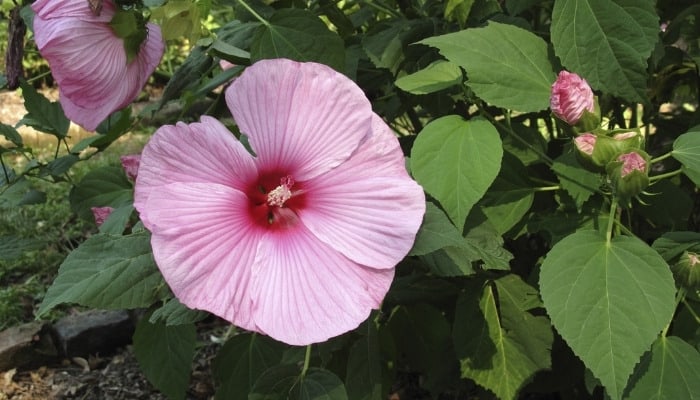
Large, eye-popping flowers can grow up to 12 inches across, although they usually max out at 10 inches.
Color can range from bright red to pink-blushed white, blue, or purple, and they’re often seen with red or burgundy throats and various shades of streaks to the flower edges.
The hardy hibiscus requires a minimum of six hours of full sun per day.
3. Hardy Impatiens
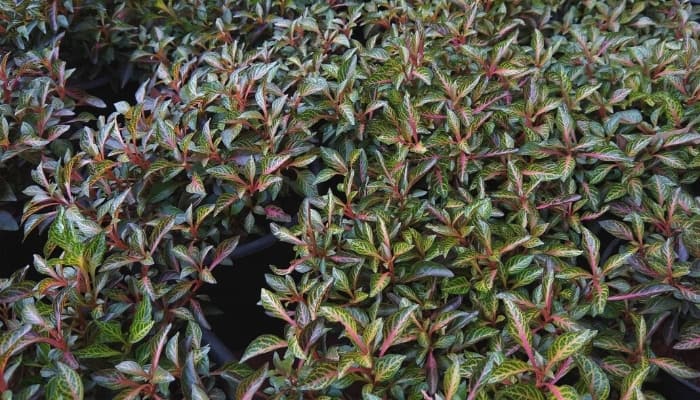
Hardy impatiens vary, ranging from low-growing species to those reaching 2 meters. They have an extended flowering period from midsummer to the first frost.
They feature free-flowering blooms with colors ranging from yellow, red, and blue to white and pink.
Hardy impatiens prefer a moist semi-shaded site and don’t do well in hot direct sunlight.
4. Hardy Primrose
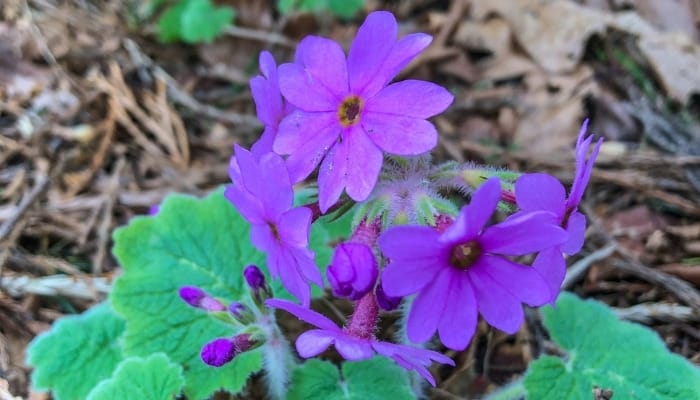
This herbaceous perennial boasts flower clusters of two to six colorful flowers that grow up to 3 inches across in mid to late spring.
The flowers emerge atop stout, leafless stems above a foliage mat of thick wrinkled, light-green leaves.
It grows in clumps and loves partial shade and well-drained, consistently moist, humus-rich soils.
5. Haworthia
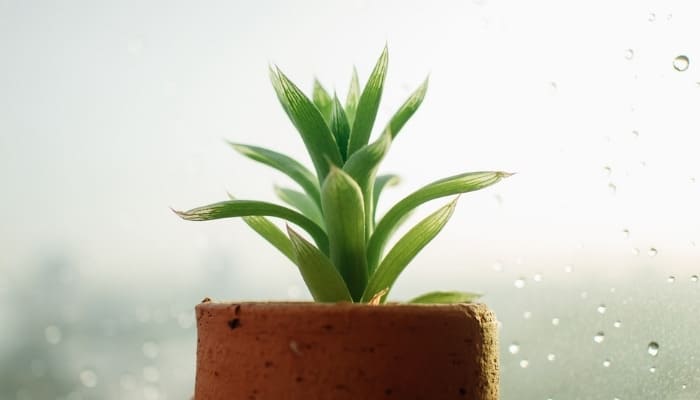
Haworthias are succulents that look similar to miniature aloe vera, making them attractive flowering houseplants. It usually blooms and flowers on the longest day of summer.
Haworthias don’t need much care or fuss and can go for weeks without water. They’re reasonably adaptable and can take various light conditions except for direct sunlight or deep shade.
6. Heather
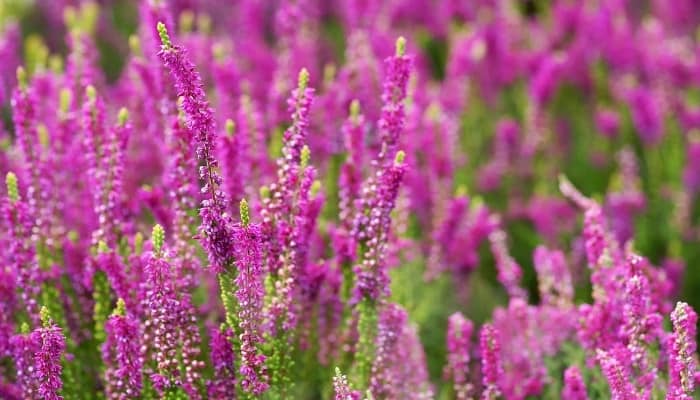
Heather is an evergreen branching shrub that usually flowers in mauve or purple shades. Heather flowers of different varieties bloom from late July to November.
The flower’s colors can range from white to pink and a wide range of purples and reds. Heathers prefer full sun conditions and protection from cold winter winds.
7. Heavenly Bamboo
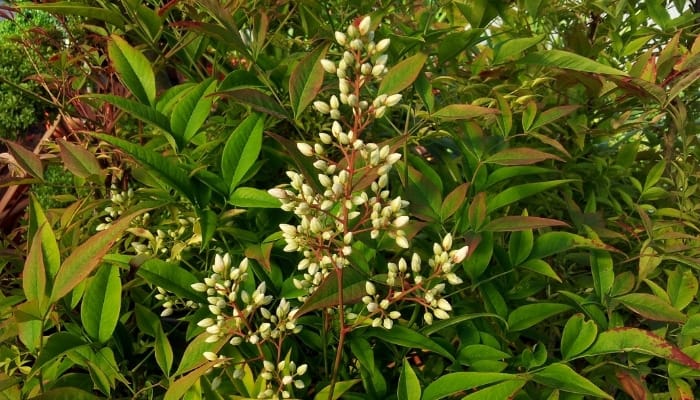
Scientifically called the Nandina domestica, the heavenly bamboo is notable for its excellent foliage and red berries.
Tiny, white flowers adorned with golden anthers appear in its long arching panicles at the tip of the branches in spring.
The heavenly bamboo grows up to 4 to 8 feet and 2 to 4 feet in width. They excel in full sunlight or partial shade.
8. Hebe
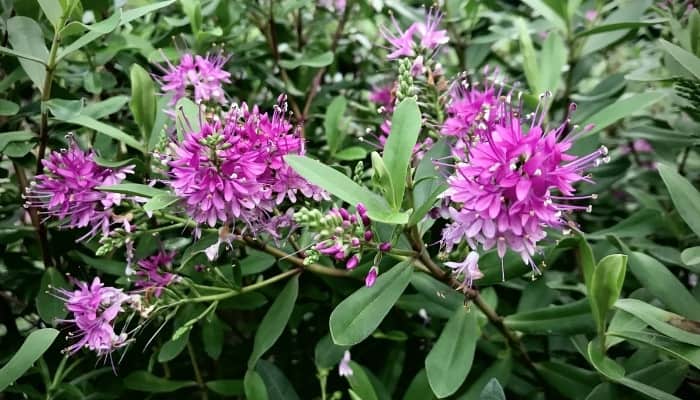
The hebe is an evergreen shrub that can grow around 3 feet tall to up to 6 feet. Most hebes bloom in the summer and last through the fall with spiked flowers ranging from white, crimson, and pink to purple and blue.
They can grow in sunlight or shade, but full sun is preferable.
9. Helenium
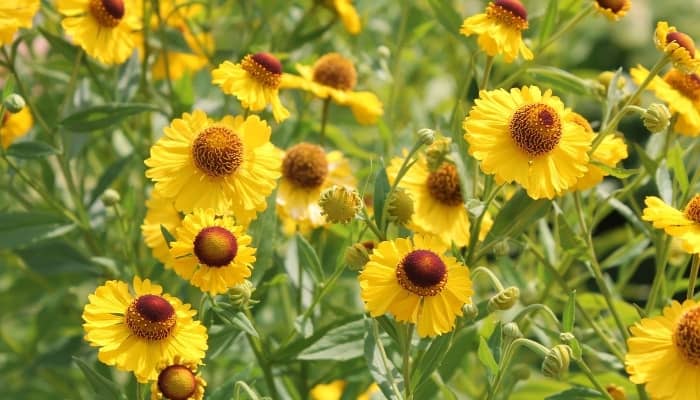
The Helenium autumnale, commonly called Helen’s flower or sneezeweed, is an erect clump-forming herbaceous perennial that grows 2 to 5 feet tall.
They produce velvet textured flowers in dense terminal clusters for long periods.
The 1- to 2-inch-wide flowers have a daisy pattern ranging from bright and pale yellow to warm orange, gold, deep red, or coppery brown. It does best in full sun conditions with moist soil.
10. Helianthemum
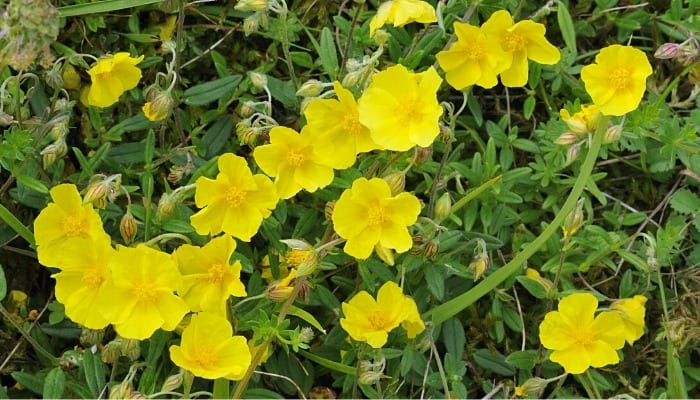
Helianthemums are hardy or half-hardy perennials that can reach 12 inches in height with green or silver foliage.
They flower from spring to autumn with scarlet, orange, yellow or bronze flowers.
Flowers bloom for only a day, so you have to remove the fading ones regularly. They prefer full sunlight conditions.
11. Heliotrope
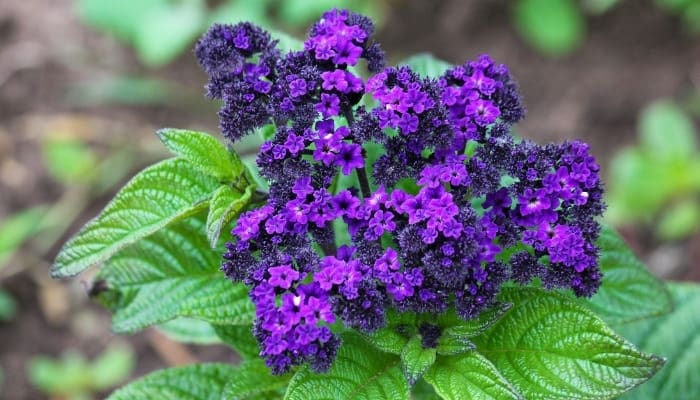
Heliotrope flowers are temperate perennials with a delicious aroma ranging from cherry pie to vanilla. The flowers grow from 1 to 4 feet high and come in varieties of white and pale lavender.
The hardiest and most fragrant are traditional deep purple. A few hours of sunlight are needed daily. All parts of the plant are poisonous to humans and animals.
12. Hellebore
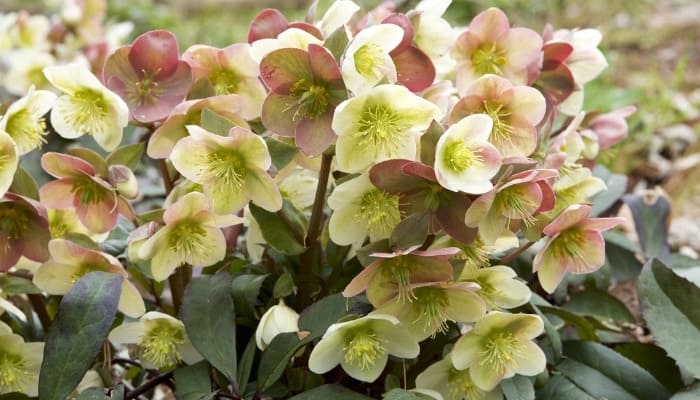
Hellebores are evergreen or herbaceous perennials with lovely and unusual flowers. The flowers bloom in late winter to early spring, sometimes while the ground is covered in snow.
Colors range from white to black and are usually fragrant and long lasting. All parts of the plant are poisonous. Proper sunlight is required.
13. Helichrysum
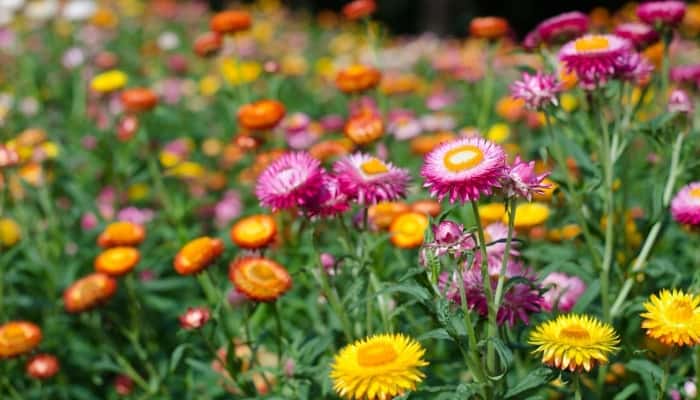
Often called the everlasting flower, the Helichrysum bracteatum is a short-lived perennial. It boasts daisy-like flowers that grow up to 1 to 2 inches across.
They feature a central yellow disk surrounded by glossy, petal-like bracts in brilliant orange, yellow, pink, red, or white shades.
They thrive in full sun conditions with well-drained, fertile soils.
14. Hemlock
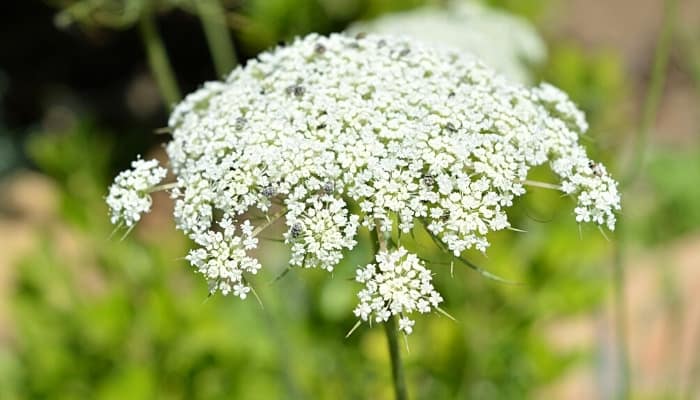
The hemlock is notoriously poisonous, and it produces umbrella-like clusters of tiny white flowers in the summer.
It’s easily found in damp places, growing in huge colonies in ditches, riverbanks or waste ground.
The tall, upright plant has a distinguishable and unpleasant smell on the foliage and purple-spotted stems.
15. Hemp Agrimony
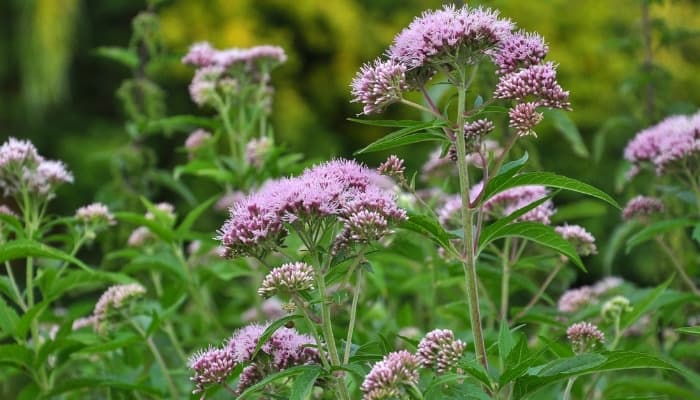
The hemp agrimony is a member of the daisy family and grows up to 1.5 meters with palmate toothed leaves and reddish stems.
Commonly called Raspberries and Cream, the Eupatorium cannabinum produces dioecious flowers where male and female flowers occur in individual plants.
They’re small dense trusses of five or six florets and vary from very pale to mauve.
16. Hepatica
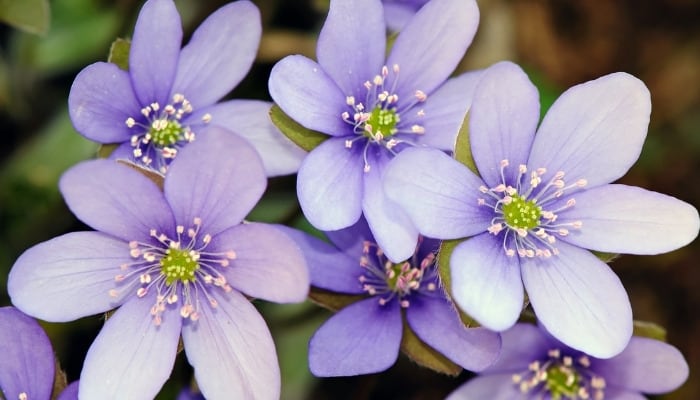
The Hepatica nobilis bloom in various pink, white, purple, and blue shades with a yellow center.
Hepatica is also called liverwort or liverleaf since its leaves resemble a human liver, and it aids in liver disorders.
Single flowers bloom on top of stems and have a delicate scent. It grows well in partial or full shade and well-drained soil.
17. Hesperaloe
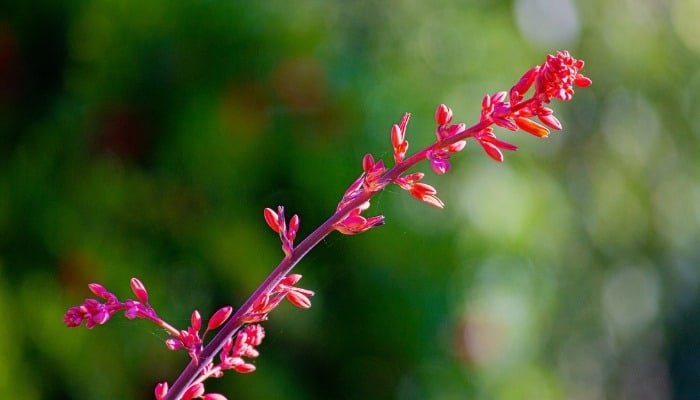
The Hesperaloe parviflora is a stemless clump-forming plant with grass-like arching and spreading foliage.
It produces clusters of small but showy pink, red, yellow, or coral tubular flowers in late spring on long and branching inflorescences.
The blooming period can last till midsummer or longer. It prefers full sun conditions.
18. Hesperis
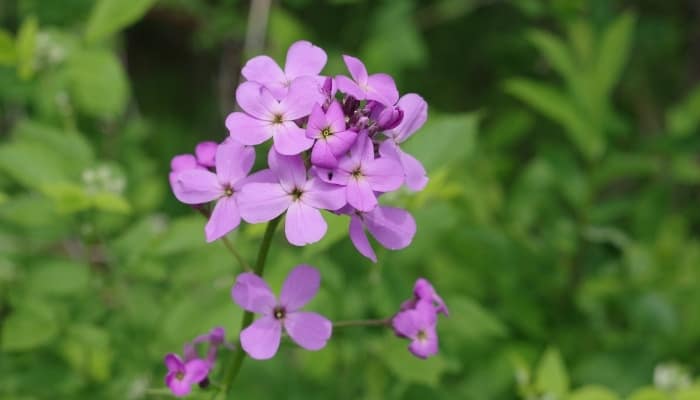
Hesperis matronalis, also known as sweet rocket, is a short-lived perennial. It produces attractive flowers varying in color from deep rich purple through all the paler lilac shades to white.
The flowers have a delightfully sweet fragrance that is most pronounced in the evenings. It’s a noxious weed that’s difficult to eradicate once it gets a foothold.
19. Hibiscus
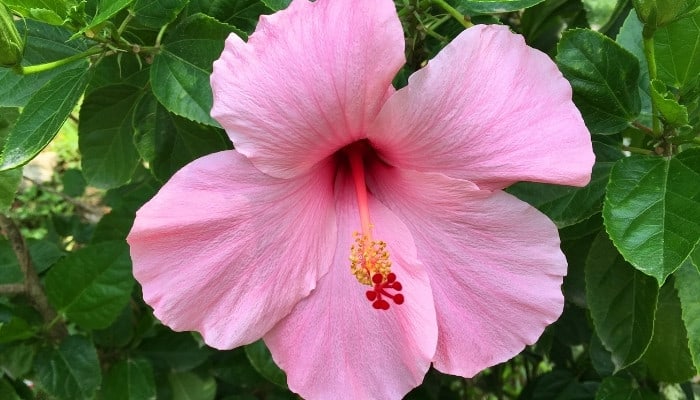
The hibiscus is a must-have summer perennial (though it comes in tropical annual forms as well) that’s guaranteed to brighten up any summer garden.
It has bright, exotic, beautiful flowers that are huge and striking, sometimes reaching up to 12 inches across.
Colors range from pink and white to rich purple, deep crimson, lavenders, and lilacs. It prefers full sunlight.
20. High Mallow
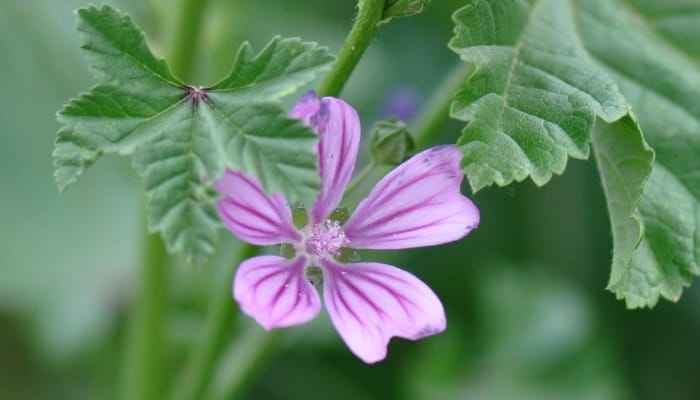
The high mallow or Malva sylvestris is an erect perennial that can throw flowering spikes up to 1.5 meters tall in the autumn and summer.
The flowers have five petals and are grouped in leaf axils. They’re usually funnel shaped, notched, and pink. It prefers sunlight but can grow in light shade.
21. Hoary Vervain
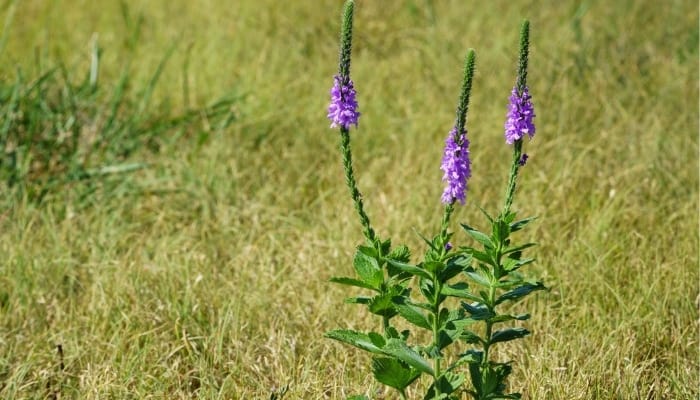
Also called Verbena stricta, hoary vervain is an erect, short-lived perennial. It has ovate to oblong, white-haired, gray-green leaves.
Spike-like panicles of slender, lavender to pink flowers bloom from the bottom up from midsummer to early autumn.
It can reach 1.2 meters tall and spread 0.5 meters after 1-2 years. It prefers full sunlight.
22. Hollow Root
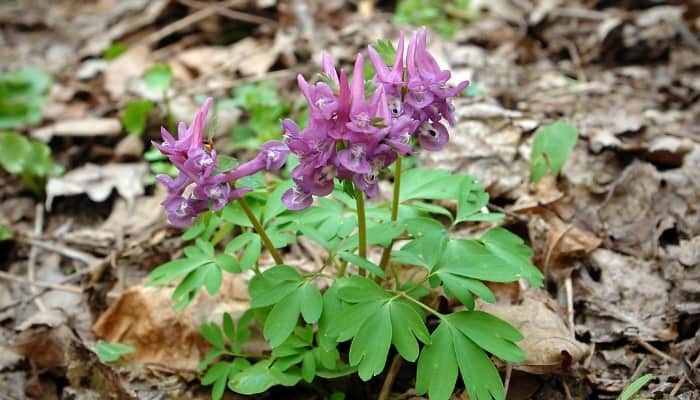
The hollow root, or Corydalis cava, is a herbaceous perennial that can reach 6 to 12 inches. The flowers blossom from March to April and range from white to violet and dark pink.
They have a slight fragrance, and the petal ends in a long, curved spur. Each flower is 0.8 to 1.2 inches, but 10 to 20 of them sit together in racemose inflorescences.
It prefers shady to semi-shady areas, and all plant parts are toxic.
23. Hollyhock
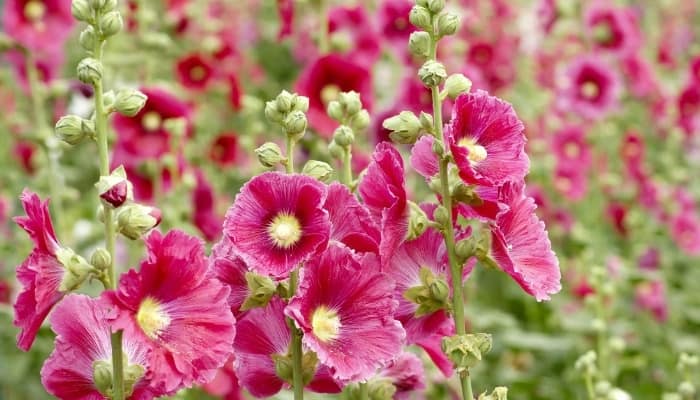
Hollyhock or Alcea is a short-lived perennial. They grow up to 2 meters in height. Each stem bears open flowers from July to September, measuring 10 centimeters in diameter.
They come in various colors from deep maroon, a mix of white, pink, and purple to pure white. They prefer sunny spots with moist but well-drained light soil.
24. Holy Thistle
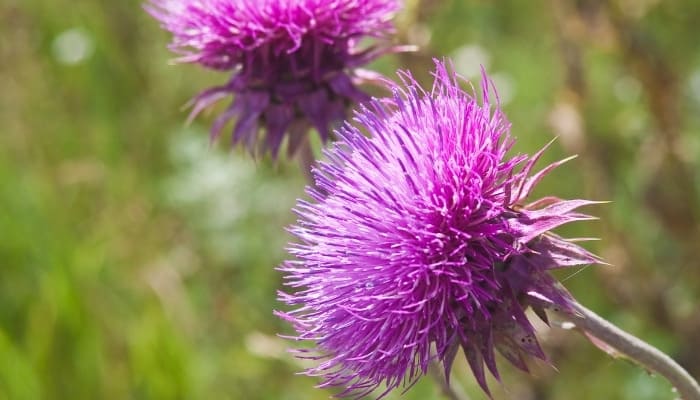
Also called the blessed thistle, milk thistle, or Silybum marianum, the holy thistle features large purple flower heads.
Blooming occurs from June to August, and the shiny black seeds used medicinally are collected at the end of summer at their ripest.
It can be 5 feet in full or partial sunlight and well-drained soil.
25. Honesty
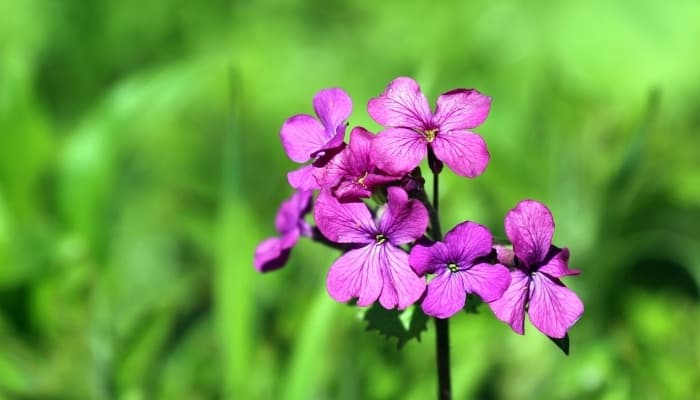
Honesty or Lunaria is a biennial garden plant. It produces very attractive white or purple flowers with a great fragrance in spring and early summer.
Some varieties feature wonderful chocolate leaves and lilac flowers and grow to a height of 1 meter.
The nectar-rich flowers attract all kinds of insects. It does best in partial shade and alkaline soil.
26. Honeysuckle
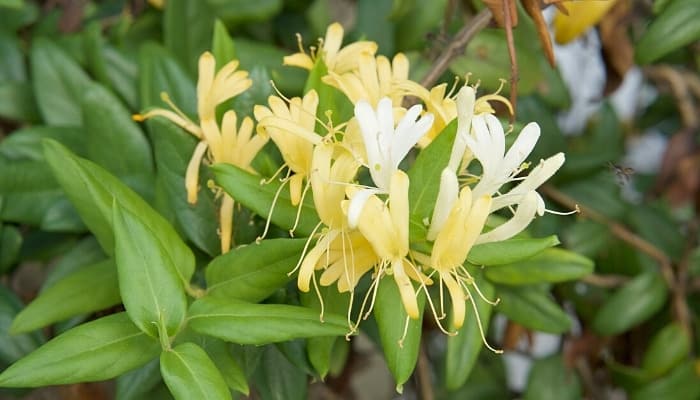
Honeysuckle from the genus Lonicera can be deciduous or evergreen and of the climbing or shrubby variety.
The climbers feature pretty, scented, tubular flowers in summer in cream, white, pink, lemon yellow, raspberry red, or orange shades.
They do well in partial shade, with the roots shaded and the stem in the sun.
27. Hooded Pitcher Plant
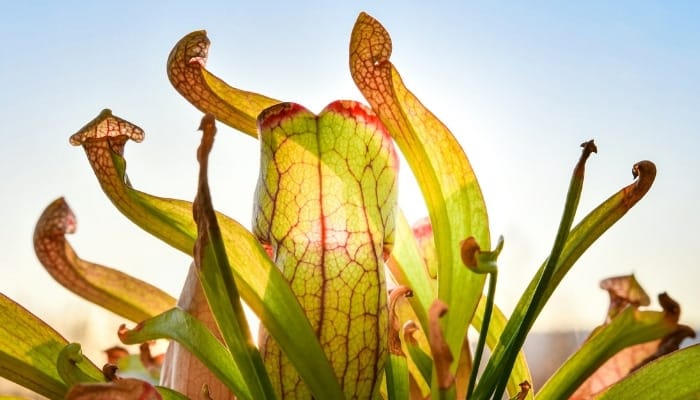
Also called the Sarracenia minor, the hooded pitcher plant is a carnivorous perennial known for its yellow-green upright pitchers topped by an overarching hood.
Mildly fragrant, clear green or yellow flowers rise atop the leafless stalks in spring. The plant does well in full sunlight and consistently moist to wet acid soil.
28. Hooker’s Orchid Cactus
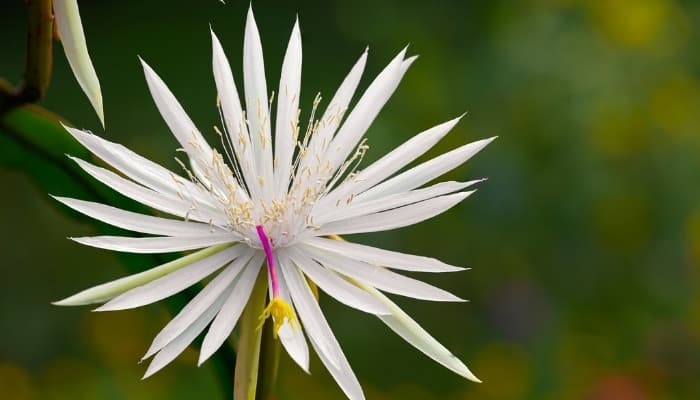
The Epiphyllum hookeri, commonly called the hooker’s orchid cactus, produces big, fragrant white flowers in summer.
It’s a night-blooming cactus, where the flowers only open at night and are closed by morning. It can reach 0.6 to 1.2 meters and does best in partial shade and very well-draining soil.
29. Horehound
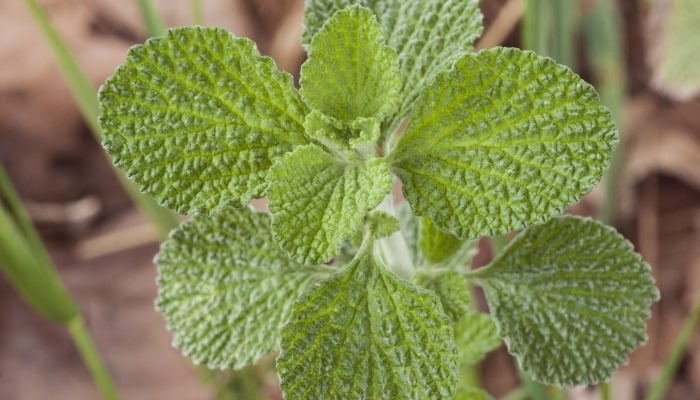
The horehound or Marrubium vulgare is a hardy perennial with grey-green wrinkled leaves that give it a wooly appearance.
It can reach 2 feet and produces attractive white flowers in its second year. It’s a very bitter herb that was once used in flavoring beer.
It does well in sunlight with the crown above the soil level.
30. Horned Violet
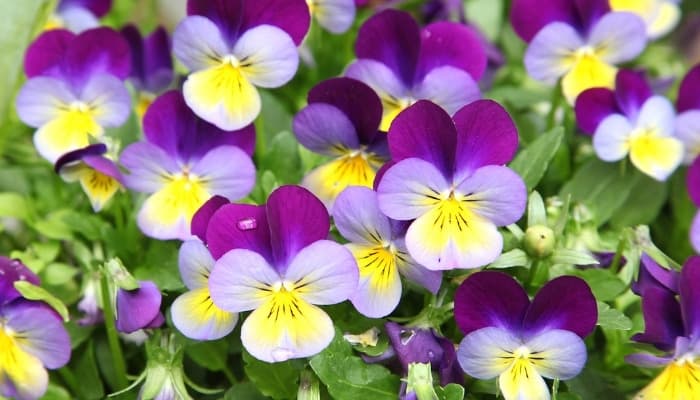
The horned violet is a small undemanding perennial that resembles bedding violas. It features slightly small flowers with narrow petals that give it a wild look.
The blooms are usually two-toned, with more common violet, blue, and lavender colors. It has a long, thin, upward-pointing nectar spur, hence the name.
It does well in full or partial sunlight and moist soil.
31. Horse Crippler Cactus
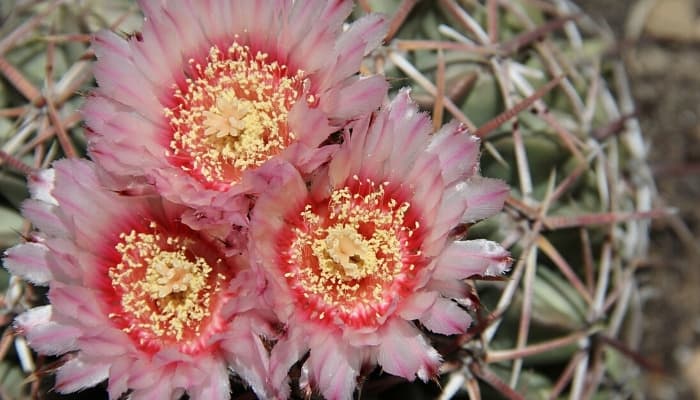
The Echinocactus texensis or horse crippler cactus is a flat, low-growing barrel cactus with pink flowers and claw-like spines.
It can grow 4 to 6 inches tall and 10 to 15 inches wide.
It blooms in the summer with showy flowers in pink, white, orange, and red shades. It does well in full sunlight and sandy or low fertility soil.
32. Horseradish
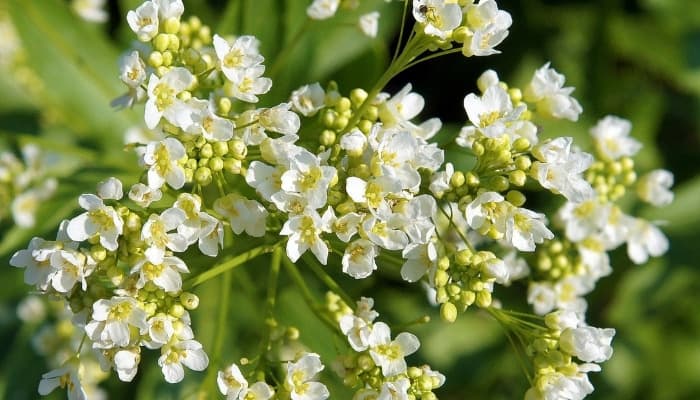
Horseradish or Armoracia rusticana is a very hardy and pungent perennial primarily grown for its peppery roots.
Flowering is unpredictable, and you may or may not see it flowering in the summer.
Some produce stalks laden with lacy white flowers, while others do not. It grows best in sunlight and deep, well-draining soil.
33. Hosta
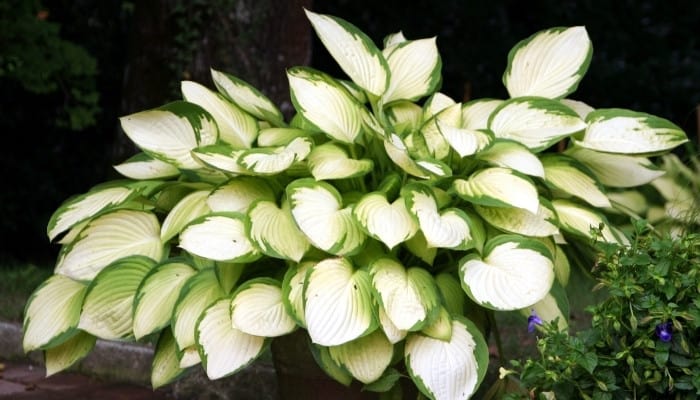
Hostas are mostly grown for their foliage and have attractive and sometimes scented summer flowers. They’re clump-forming perennials well-suited for container gardeners.
They produce pretty purple or white blooms on tall stems, but they can get tatty after a few days. Hosta does well in moist, fertile soil and partial sunlight.
34. Hoya
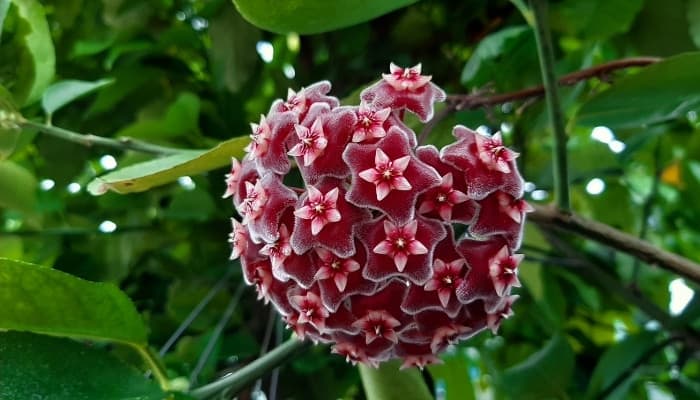
Hoya plants are sometimes called porcelain or wax flowers, thanks to their ornamental leaves and beautiful, sweet fragrance flowers.
These evergreen houseplants feature small, star-shaped flowers with a distinctive wax-like shimmer with different colors depending on the species.
They can grow like veins or shrubs and flower between spring and autumn. Hoya grows well in shade and well-drained soil.
35. Hyacinth
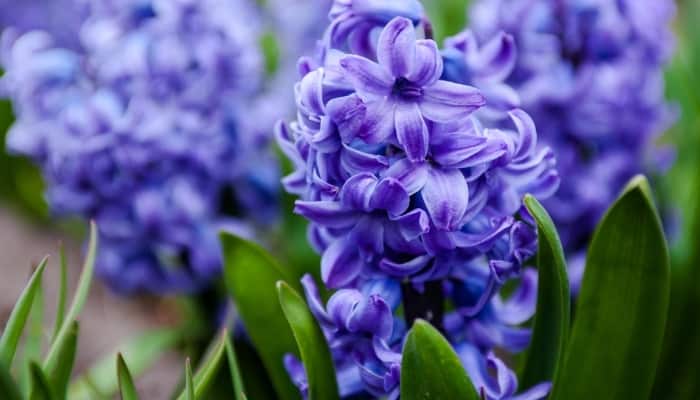
Hyacinths are famous for their highly fragrant blooms. They’re colorful spring-flowering garden plants widely grown in bedding displays as houseplants.
They produce large flower heads in white and pink, blue, deep red, purple or yellow shades. Hyacinth does well in full sunlight or partial shade and sandy, chalky, loamy or clay soil.
36. Hybrid Tuberous Begonia
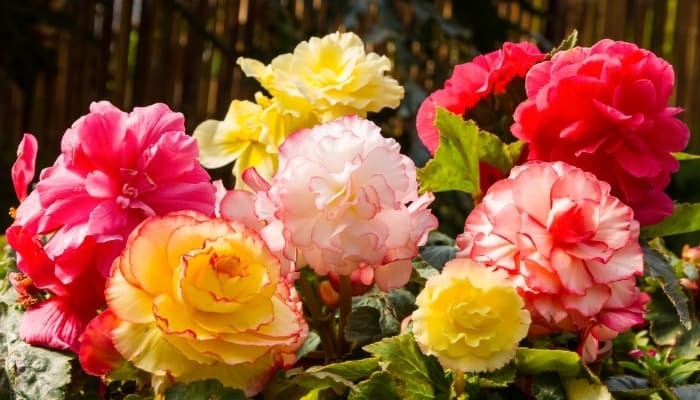
Hybrid tuberous begonias are well suited for growing in hanging baskets and containers.
They feature a long flowering season and are ideal if you’re looking for continuous color throughout the summer to the first frost.
The flower colors can be red, yellow, or white. They do well in full or partial sunlight and moist sandy soil.
37. Hydrangea
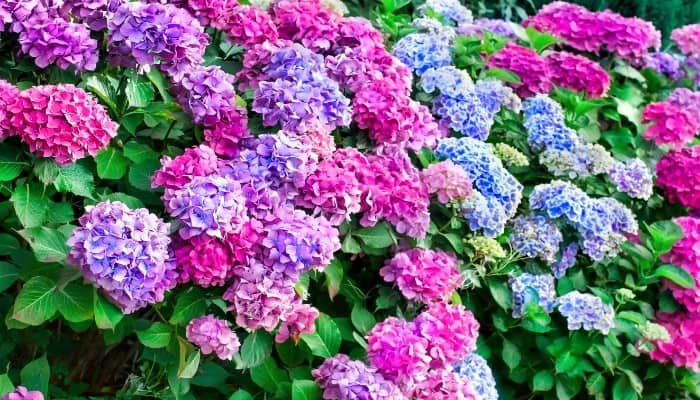
Mopheads and lace caps are the most commonly grown hydrangeas, the names describing the shape of the flowers.
Lace caps have flatter flowers that are smaller than mop heads. Both bloom satisfactorily with little attention from mid to late summer.
Soil acidity and alkalinity will affect flower colors. Acid soil produces blue flowers, while alkaline soil produces pink flowers.
38. Hypericum
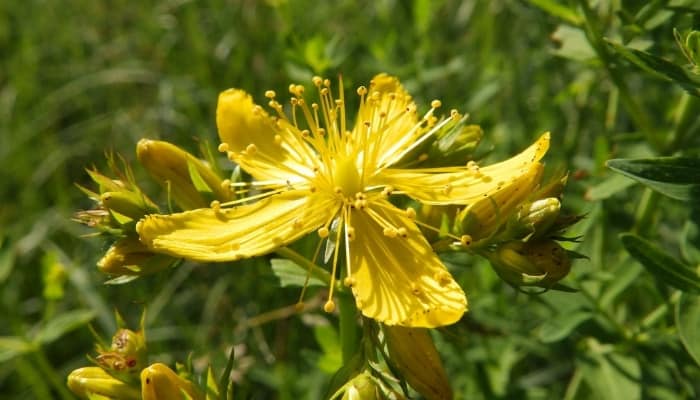
Hypericum Hidcote is the most common hypericum, and it produces masses of medium-sized yellow flowers from July to August.
They reach 1.5meters max and are almost impossible to get rid of, growing again even after cutting it down below ground level.
They tolerate full and partial sunlight well but grow best in the shade.
39. Hyssop
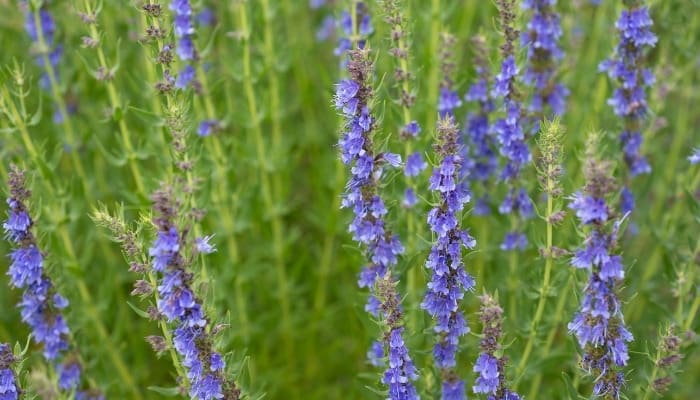
The hyssop or Hyssopus officinalis is a spreading, compact semi-evergreen sub-shrub. It has erect shoots that bear linear, aromatic leaves and terminal spikes of 2-lipped, whorled, tubular blue flowers in summer and early autumn. It grows to a maximum of 0.1 to 0.5m and does well in full or partial sunlight and moist, well-drained soil.
Conclusion
Flowers that start with H are beautifully fascinating and unique.
They’re not just pretty sights to admire and adore. They’re quite versatile with culinary, medicinal, and aesthetic applications.
Whether it’s a flower to add beauty or charm or meet practical needs, you’ll find something suitable!

